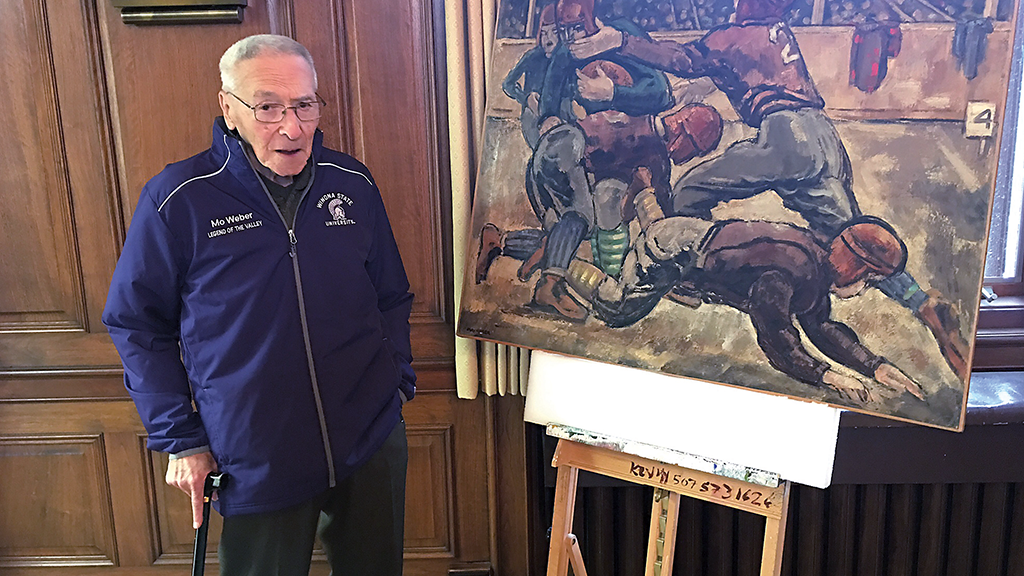Maynard “Mo” Weber ’50 has been known as many things throughout his 93 years on Earth – a soldier, a student, a teacher, a coach, a stockbroker. But what many may not know is that he is also the son of highly regarded American artist Max Weber, and that both his and his father’s legacies will be forever intertwined with that of Winona State thanks to Mo’s love for WSU and generous spirit of philanthropy.
Mo Weber came to Winona State as a student in 1946, after serving in the Army during World War II. Spending time at Camp McCoy in Wisconsin, he had stopped in Winona on a trip through town and said, “that’s where I want to go to school.”
While earning his bachelor’s degree in education at WSU, Mo coached Warrior Baseball, assisting Luther McCown and earning two letters as part of the program. On the subject of Dr. McCown, the venerable namesake of WSU’s McCown Gymnasium, he says, “he was good to me, he was a great guy, a great teacher.” During Weber’s time, the team boasted a record of 39-20-1 and captured a conference championship in 1948. After he graduated and spent some time teaching elementary school in Winona, he moved on and began coaching baseball across the country – until the age of 87.
He may have moved on to new adventures, but Mo’s heart remains at WSU. “I talk about Winona all the time, and I live in Virginia where they have never heard of anything but Virginia – never heard of Winona,” he says. “I tell people I went to the Harvard of the West…it gave me an education I would have not had elsewhere. If I could, I would come back again.”
For Mo, the reason he chooses to give back to Winona State is simple and straightforward – “because the four years I spent here were great. I love this place.”
And give back he does – he has donated numerous paintings of his father’s to Winona State, including the 1951 work titled “Mexican Water Jug,” currently on display in Krueger Library, and the 1932 work titled “Football Players,” a unique piece as Max Weber only created three sports scenes during his lifetime. And while Mo insists that he doesn’t have a favorite piece of his father’s, he says that Winona State’s “got some of the good stuff – I think you’ve got some lovely paintings, great paintings.”
Max Weber, born in Russia, immigrated to New York City with his parents in 1891. He studied at the Pratt Institute in Brooklyn under renowned teacher Arthur Wesley Dow, at the Academie Julian with Henri Matisse, and formed friendships during his career with artists Henri Rousseau and Pablo Picasso. When asked how he would like his father’s legacy remembered, Mo answered “like it is right now – in my eyes, he’s top dog. My father came to this country when he was 10 years old. By the time he was 20, he spoke the language better than I did, could write better than I did, created poetry and philosophy that I hardly understand. He was a unique personality.”
In October 2016, Mo returned to campus to officially dedicate “Football Players” to WSU, tour the future Laird Norton Center for Art & Design, where his father’s work will be proudly on display upon completion of the building’s full renovation project, and visit the place where his heart has remained all these years.
In addition to Mo’s generous donations of his father’s artwork, he has given back to Winona State in many other ways. On the second floor of Watkins Hall, the Weber Gallery is named in his father’s honor, used to showcase student exhibits as well as junior and senior salons and evaluations. Additionally, Mo and his late wife established two endowments at Winona State with the purpose of helping undergraduate art students attend the University. In 1989, they created the Dorothy F. Weber and Maynard J. Weber Art Scholarship Endowment for eligible freshman students. Three years later, they established the Max Weber Scholarship Endowment for eligible juniors.
“Mo Weber has been an integral part of Winona State for decades,” says Winona State President Scott Olson. “Not only is he an alumnus and past baseball coach, but a former WSU Trustee, Distinguished Alumni Award Winner, and WSU Hall of Fame Inductee, all of which illustrate his exemplary dedication to Winona State. He is a generous benefactor of the University with nothing but love in his heart for the school, the people, and the city of Winona itself – and that will be his own legacy for decades to come.”


